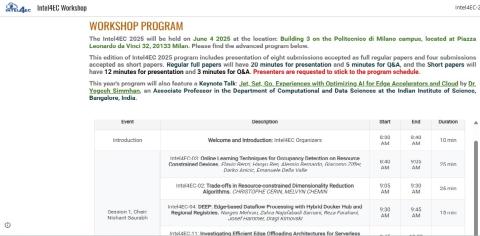
The paper “Online Learning Techniques for Occupancy Detection on Resource Constrained Devices” by Flavio Renzi, Haoyu Ren, Alessio Bernardo, Giacomo Ziffer, Darko Anicic and Emanuele Della Valle - some NEPHELE colleages from SIEMENS - have been accepted by INTEL4EC 2025 and presented to the audience on 4th June 2025 in Politecnico di Milano campus.
Intel4EC workshop aims to bring together researchers, developers and practitioners from academia and industry to present their experiences, results and research progress covering architectural designs, methods and applications of AI/ML/LLM-enabled Edge-Cloud operations and services. Intel4EC looks forward to helping the community define open standards, AI/ML benchmarks that contribute to experiment reproducibility and systematize the complete management pipeline for a myriad of Cloud-Edge operations.
This paper is related to their activity in NEPHELE Use Case 3 about energy efficiency.
In light of the increasing impact of climate change, the demand for energy-efficient solutions across various sectors is becoming crucial. This paper explores the feasibility of utilizing Online Learning techniques to detect room occupancy in smart buildings, addressing the challenges of privacy and cost.
The methodology presented in this paper leverages existing environmental sensor data without requiring additional hardware, ensuring privacy and cost efficiency. The adaptability of Online Learning models to new environments is a key advantage, eliminating the need for extensive data storage and making the approach suitable for real-world applications. This research focuses on developing and testing this innovative approach, emphasising the constraints of embedded devices to ensure practical deployment without new hardware requirements. Its extensive testing campaign evaluates the performance of the five most commonly used algorithms in this field, highlighting the viability of Online Learning techniques for deployment on embedded devices. This research lays the foundation for developing energy-efficient solutions in smart buildings, offering a cost-effective and privacy-oriented approach to occupancy detection.

